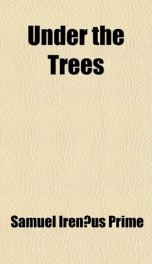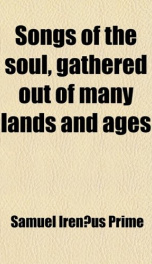under the trees

Purchase of this book includes free trial access to www.million-books.com where you can read more than a million books for free. This is an OCR edition with typos. Excerpt from book: III. THE ROSES. Just now there are at least a thousand, perhaps two thousand roses in full bloom in sight as I sit on an old tumbledown settee under a tree in the midst of the garden. They are of all known colors for roses, and their names are far beyond my attainments in the science of flowers. Beautiful exceedingly, we can repeat again and again as we look at them, but even as we look they are passing away. Beauty soon decays. And this led me off into a meditative ramble on the old question of the distinction between the useful and the beautiful, as if beauty were not useful, and the useful necessarily not beautiful. And it occurred to me that there is another question to be answered first, on the answer depending the result to which we shall come in looking after the comparative merits of cabbage-roses and cabbages. If we live to eat, and that is most to be desired which gives us food; if we live to dress, and that is best that yields us clothes, we shall very soon have a standard by which to measure the value of every thing within our reach. But by so much as the inner life is more than the visible, and the enjoyment and advancement of the soul more to be desired than the lust of the flesh or the pride of life, so is the gratification, the cultivation, and perfection of the higher tastes to be esteemed of more account than those which man has in common with the brutes that perish. Home Tooke defined virtue to be any thing that answers its purposecertainly a very low and disgusting conception of the term. But we may say that every thing beautiful is or ought to be useful, and if it is not so, it is either neglected or abused. Because more than one half of the world go through it without a thought of the charms with which its face is clothed, we often fall into the ...
Users who have this book
Users who want this book
What readers are saying
What do you think? Write your own comment on this book!
write a commentif you like under the trees try:
Do you want to read a book that interests you? It’s EASY!
Create an account and send a request for reading to other users on the Webpage of the book!



